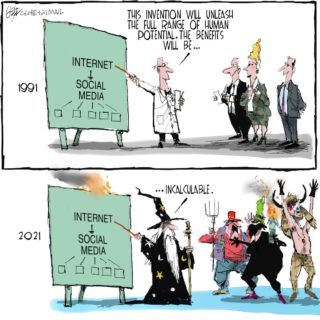Hi, I’m up here.
The mere presence of a cell or smartphone on the table can disengage people during in-person conversations and hinder their empathy, according to a new Virginia Tech study that finds your attention is divided even if you’re not actively looking at your phone.
The study, The iPhone Effect: The Quality of In-Person Social Interactions in the Presence of Mobile Devices, examines how “distracting digital stimuli” undermine the character and depth of our face-to-face interactions. Networked technologies, write the authors, let us manage several loyalties – work, family, friends – at once. But they also breed “a persistent state of ‘absent presence’ … a technologically mediated world of elsewhere.”
For many, digital distraction involves the “constant urge to seek out information, check for communication and direct their thoughts to other people and worlds,” the authors write. The phone becomes “representative of people’s wider social network and a portal to an immense compendium of information.” (A previous study by two of these researchers found that people checked their phones every three to five minutes, regardless of whether it rang or buzzed.)
The current study involved 200 people, paired off and placed in two groups at coffee shops. They were instructed to discuss either a serious topic (the most meaningful events of that year) or a trivial one ( “plastic holiday trees”) over the course of 10 minutes. A lab assistant observed unobtrusively nearby, watching the respondents’ non-verbal behaviour. The assistants noted whether the pairs put a mobile device on the table or held it in their hands (29 did, 71 didn’t). After the conversation, participants answered questions that are designed to measure “empathic concern” and “feelings of interpersonal connectedness.” (Sample: “To what extent did your conversation partner make an effort to understand your thoughts and feelings?”)
Whether the talk was heavy or light, researchers found that “the quality of the conversation was rated to be less fulfilling” when either of the two had a phone in their hands or on the table. Empathy also dropped, particularly among people who knew each other. Those clutching their phones, even if not using them, “were less friendly with each other.”
“Individuals are more likely to miss subtle cues, facial expressions, and changes in the tone of their conversation partner’s voice, and have less eye contact,” the researchers write in the study, published in the journal Environment and Behavior this month.
The research comes on the heels of Parents on Phones, a Tumblr feed that shames inattentive, iPhone-consumed mothers and fathers. Pundits seem split on whether the behaviours depicted – a mom tapping away as her daughter sits by, her leg in a cast – are bad parenting or necessary modern tool.
“Smart technologies offer the possibility of instantaneous and continuous global communities where knowledge is shared, opinions are contributed, relationships are rekindled, expressions of support are enhanced and social movements are spawned,” the current study’s lead author Shalini Misra, an assistant professor of urban affairs and planning at Virginia Tech, said in an interview by e-mail.
“But these new global communities deserve closer examination, for as this study finds, they may emerge at the cost of face-to-face interpersonal relationships.”
So resist the digital pull, be it Buzzfeed quiz or cat-related Facebook update, and look up.
ZOSIA BIELSKI
The Globe and Mail
Published Thursday, Jul. 17 2014, 3:32 PM EDT
Last updated Thursday, Jul. 17 2014, 3:43 PM EDT


